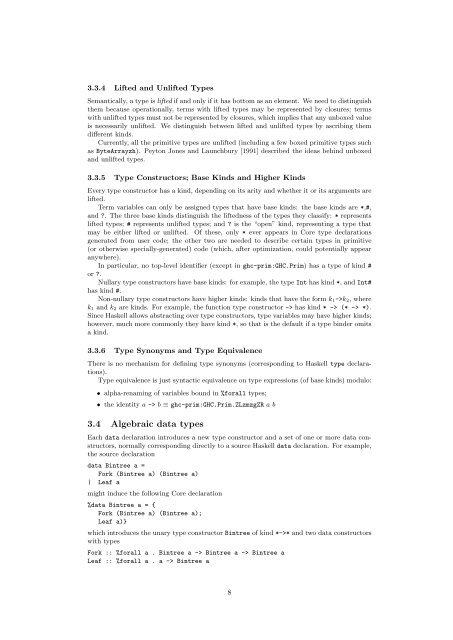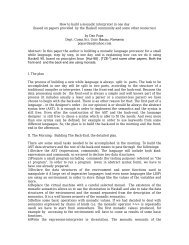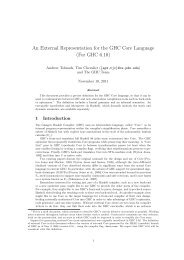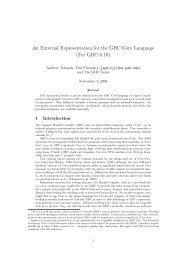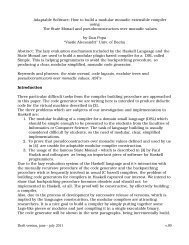An External Representation for the GHC Core Language ... - Haskell
An External Representation for the GHC Core Language ... - Haskell
An External Representation for the GHC Core Language ... - Haskell
You also want an ePaper? Increase the reach of your titles
YUMPU automatically turns print PDFs into web optimized ePapers that Google loves.
3.3.4 Lifted and Unlifted Types<br />
Semantically, a type is lifted if and only if it has bottom as an element. We need to distinguish<br />
<strong>the</strong>m because operationally, terms with lifted types may be represented by closures; terms<br />
with unlifted types must not be represented by closures, which implies that any unboxed value<br />
is necessarily unlifted. We distinguish between lifted and unlifted types by ascribing <strong>the</strong>m<br />
different kinds.<br />
Currently, all <strong>the</strong> primitive types are unlifted (including a few boxed primitive types such<br />
as ByteArrayzh). Peyton Jones and Launchbury [1991] described <strong>the</strong> ideas behind unboxed<br />
and unlifted types.<br />
3.3.5 Type Constructors; Base Kinds and Higher Kinds<br />
Every type constructor has a kind, depending on its arity and whe<strong>the</strong>r it or its arguments are<br />
lifted.<br />
Term variables can only be assigned types that have base kinds: <strong>the</strong> base kinds are *,#,<br />
and ?. The three base kinds distinguish <strong>the</strong> liftedness of <strong>the</strong> types <strong>the</strong>y classify: * represents<br />
lifted types; # represents unlifted types; and ? is <strong>the</strong> “open” kind, representing a type that<br />
may be ei<strong>the</strong>r lifted or unlifted. Of <strong>the</strong>se, only * ever appears in <strong>Core</strong> type declarations<br />
generated from user code; <strong>the</strong> o<strong>the</strong>r two are needed to describe certain types in primitive<br />
(or o<strong>the</strong>rwise specially-generated) code (which, after optimization, could potentially appear<br />
anywhere).<br />
In particular, no top-level identifier (except in ghc-prim:<strong>GHC</strong>.Prim) has a type of kind #<br />
or ?.<br />
Nullary type constructors have base kinds: <strong>for</strong> example, <strong>the</strong> type Int has kind *, and Int#<br />
has kind #.<br />
Non-nullary type constructors have higher kinds: kinds that have <strong>the</strong> <strong>for</strong>m k 1->k 2, where<br />
k 1 and k 2 are kinds. For example, <strong>the</strong> function type constructor -> has kind * -> (* -> *).<br />
Since <strong>Haskell</strong> allows abstracting over type constructors, type variables may have higher kinds;<br />
however, much more commonly <strong>the</strong>y have kind *, so that is <strong>the</strong> default if a type binder omits<br />
a kind.<br />
3.3.6 Type Synonyms and Type Equivalence<br />
There is no mechanism <strong>for</strong> defining type synonyms (corresponding to <strong>Haskell</strong> type declarations).<br />
Type equivalence is just syntactic equivalence on type expressions (of base kinds) modulo:<br />
• alpha-renaming of variables bound in %<strong>for</strong>all types;<br />
• <strong>the</strong> identity a -> b ≡ ghc-prim:<strong>GHC</strong>.Prim.ZLzmzgZR a b<br />
3.4 Algebraic data types<br />
Each data declaration introduces a new type constructor and a set of one or more data constructors,<br />
normally corresponding directly to a source <strong>Haskell</strong> data declaration. For example,<br />
<strong>the</strong> source declaration<br />
data Bintree a =<br />
Fork (Bintree a) (Bintree a)<br />
| Leaf a<br />
might induce <strong>the</strong> following <strong>Core</strong> declaration<br />
%data Bintree a = {<br />
Fork (Bintree a) (Bintree a);<br />
Leaf a)}<br />
which introduces <strong>the</strong> unary type constructor Bintree of kind *->* and two data constructors<br />
with types<br />
Fork :: %<strong>for</strong>all a . Bintree a -> Bintree a -> Bintree a<br />
Leaf :: %<strong>for</strong>all a . a -> Bintree a<br />
8


